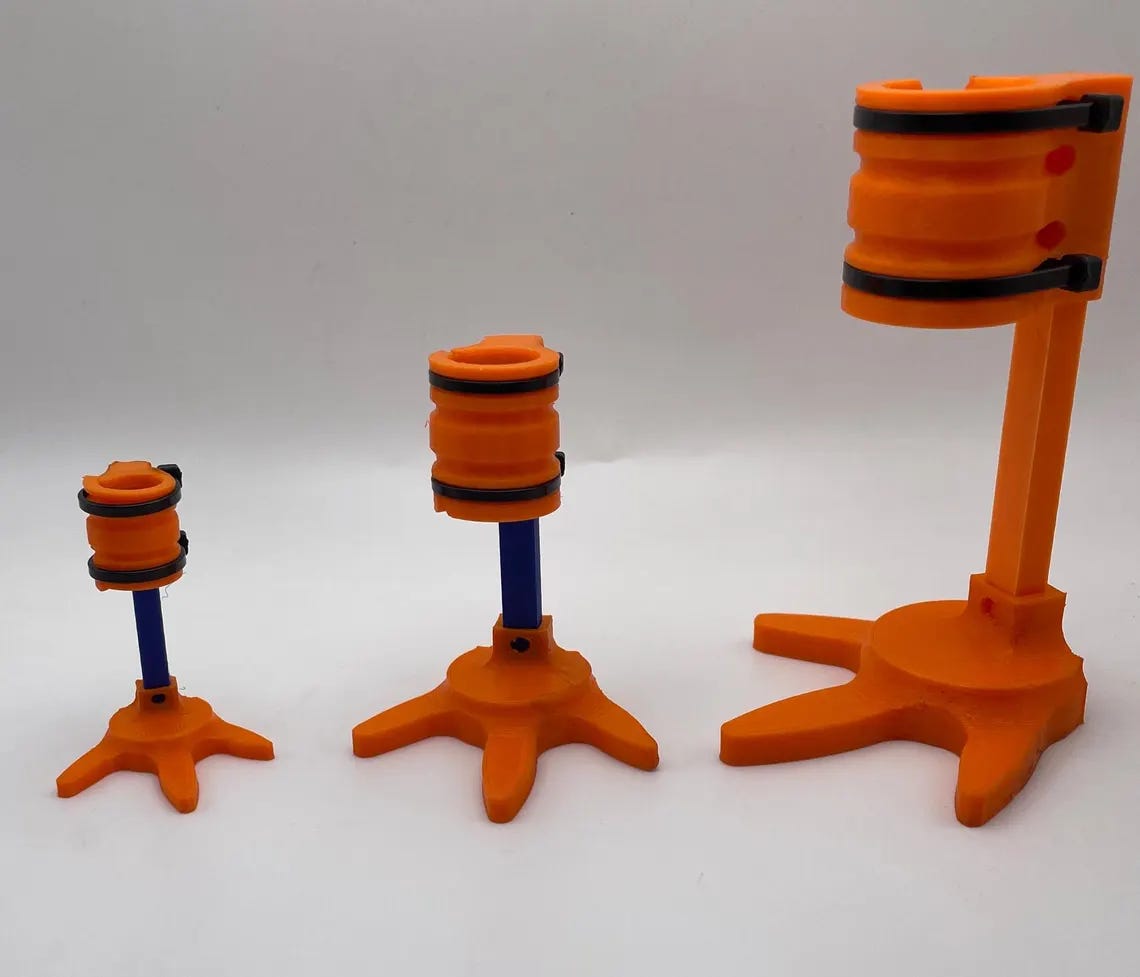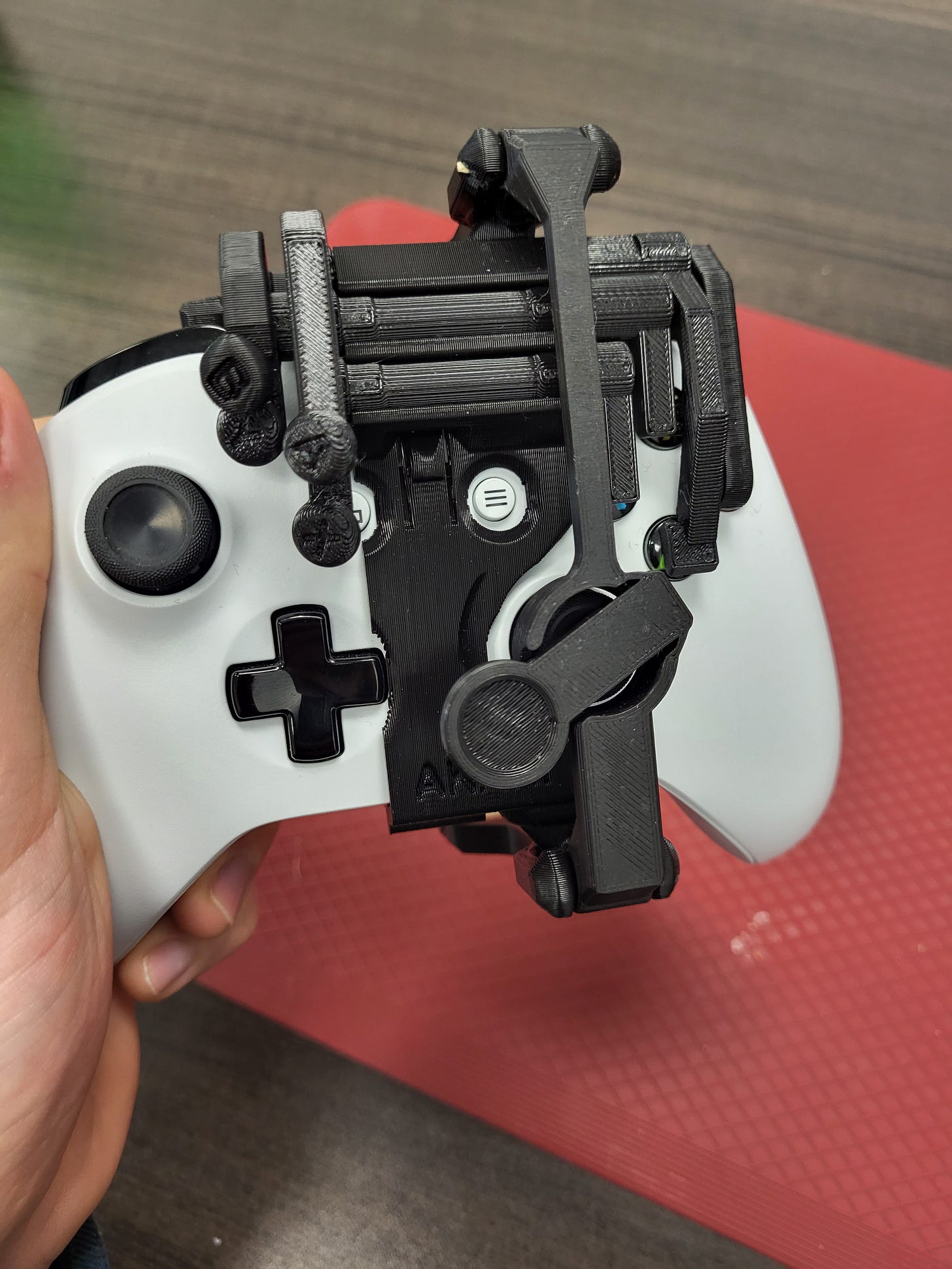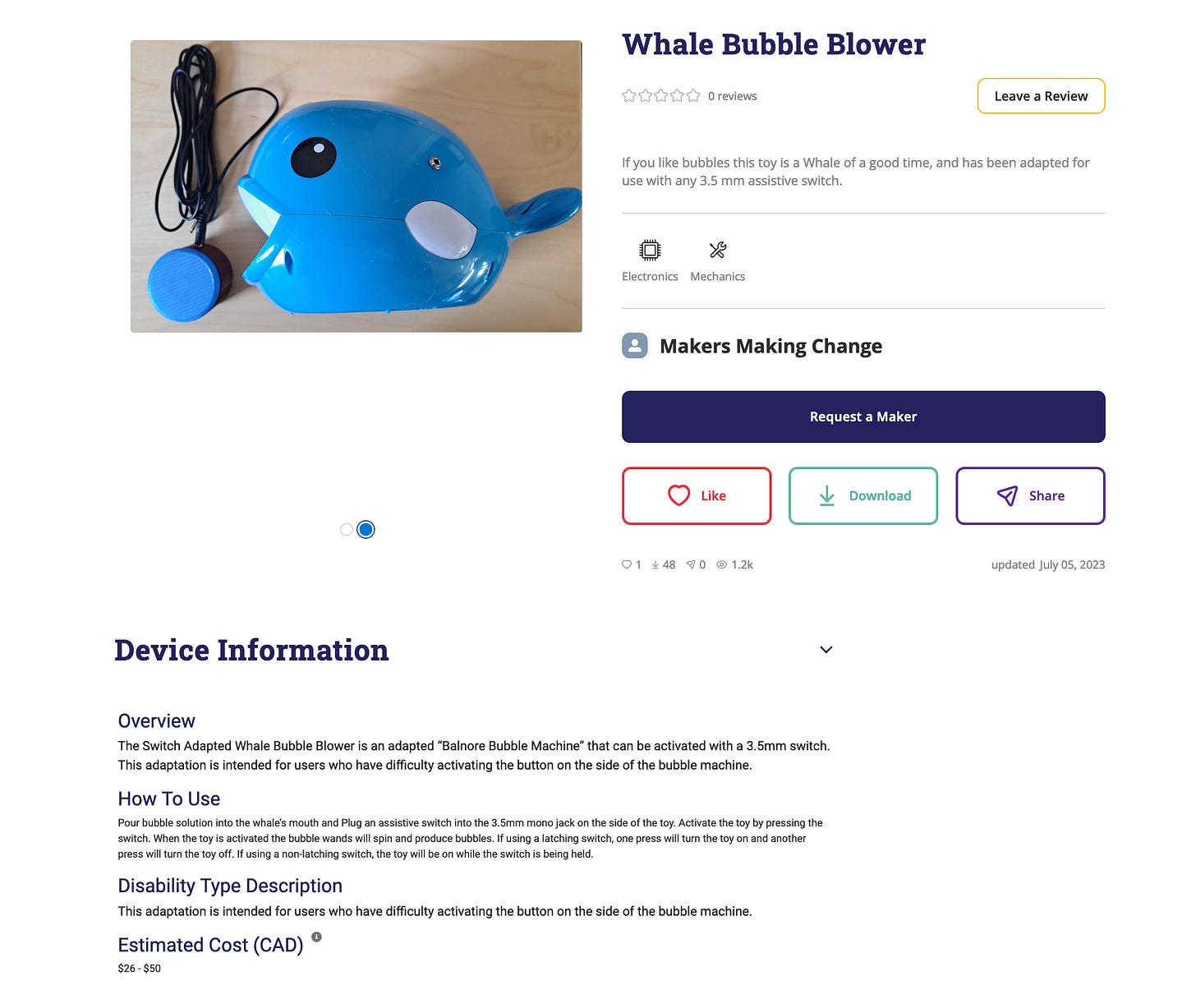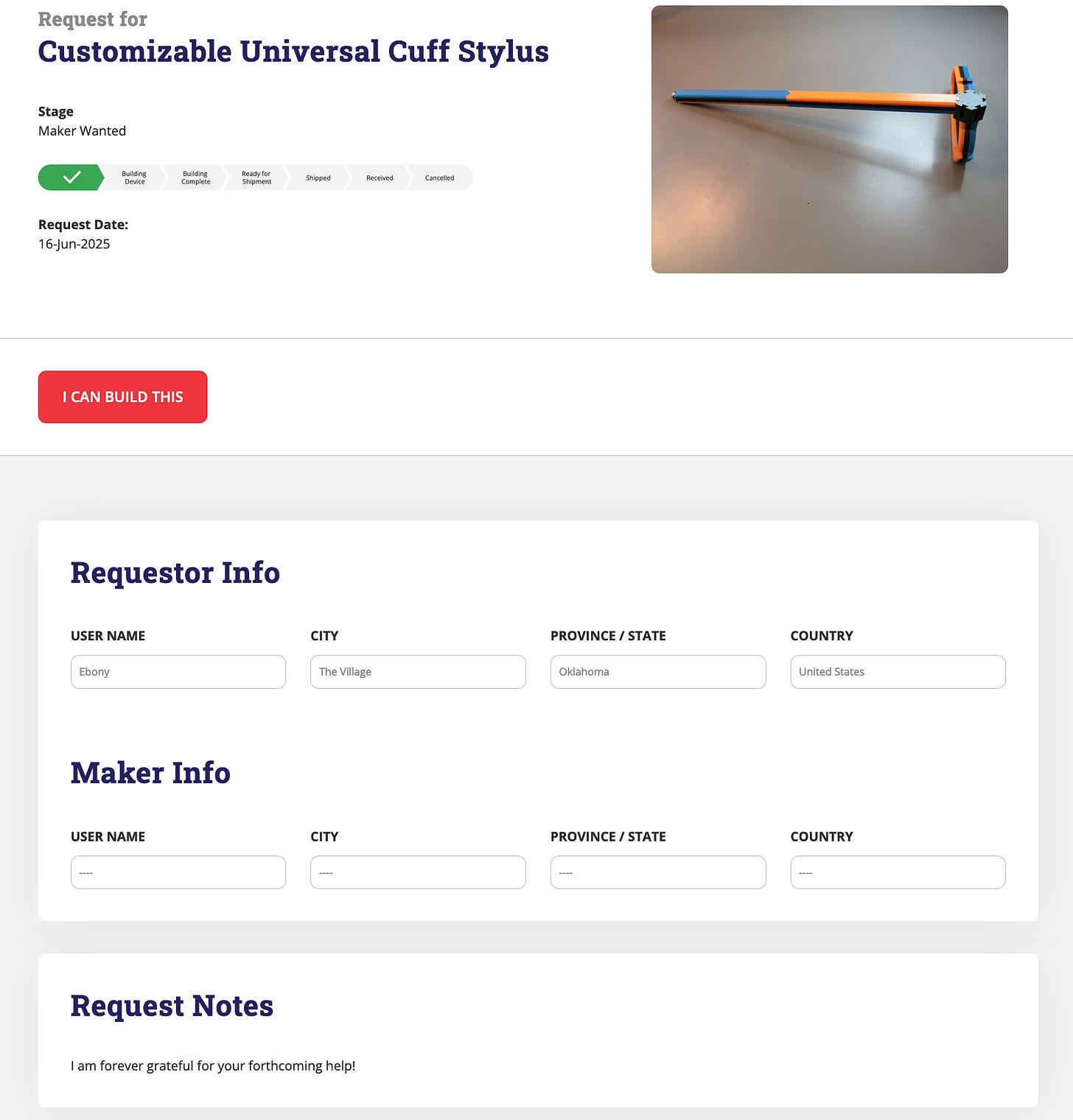Makers Making Change: When the Assistive Tech you Need Doesn't Exist (Yet)
Community-powered assistive tech through mutual aid and open-source design
Globally, over 2.5 billion people need one or more assistive tech products, and that number could hit 3.5 billion by 2050 (source, opens in new tab). Whether it’s a hearing aid, wheelchair, speech software, or a simple key turner, nearly one billion of these people can’t get the assistive tech they need because of cost, location, or lack of services (source, opens in new tab). Personally, I have a suspicion the number of people lacking access to assistive tech is even higher than one billion.
Many of us need assistive tech that either doesn’t exist - or it exists but is unaffordable, not covered by insurance, or doesn’t fit our bodies, needs, or personal style. This is where Makers Making Change (MMC) comes in. Visit the MMC website here, opens in new tab)
While I typically write about devices, today I’m writing about a platform. MMC is a nonprofit changing the way people are accessing assistive technology in an unprecedented way; their platform matches people who need assistive devices with volunteer makers who build them. They host a library of 200+ open-source designs — everything from key turners and jar openers to complex electronic switches and custom controllers. You can download a design and make it yourself, or get paired with a maker for a low-cost build (you only pay for materials and shipping).
In Production
I’ve created devices for myself using MMC open-source designs and volunteered to create assistive tech for others through their platform. I live in a community with many aging adults, and I often get requests for arthritis tools - jar openers, button helpers, etc. I print them in batches, post them on our local Buy Nothing group, and they’re gone in no time! Folks regularly message me asking for additional tools so they can continue living at home with minimal assistance. Usually any tool we’re looking for already is designed and posted on MMC - all I need to do is print it for my neighbors. The most hilarious/fun request I’ve gotten is for a prosthetic chicken leg; I never thought I would be in the adaptive limb business, but I’m happy to say the chicken is running around with her pals again! There was no MMC design for that one, but maybe I’ll add it to the library (kidding…maybe).
My favorite human build was an adaptive Xbox controller. An Assistive Technology Professional (ATP) reached out about a young man who lost mobility in one arm and couldn’t game anymore. MMC had several adaptive controller modifications we tested out together, and we ended up creating a custom one-handed Xbox controller adapter in his favorite football team’s colors. He’s back to pulling all-night gaming sessions with his friends for the cost of about $4 USD - just the cost of shipping and a bit of 3D printer filament. An out of the box adaptive solution would have cost at least $100 and not fit him as well, nor be in his favorite colors.
How to Request a Device
Requesting a device is relatively simple and inexpensive! The only cost to the person requesting the device is the materials and shipping. To request a device for you, here’s how to get started:
Browse assistive devices: Check out the 200+ open-source designs on MMC’s website. When you find one that may work for you, click on it to get more details. (Browse library here, opens in new tab.)
Check the facts: Make sure this device works for you and is affordable. Cost, features, and reviews can be found under “device information.” Cost is always a range, as the maker and requester determine how to ship the final product together in an affordable way.
Request a Maker: When you think it’s the device for you, click the blue “Request a Maker” button! If you don’t already have a MMC account, it will prompt you to create one. If you do have one, be sure you’re logged in.
Complete your Request a Build form: Once you’re logged in, you’ll be prompted to complete the “request a build” form. Put any important details about color, size, and what you’ll be using it for. This will be posted to the volunteer board for a maker to pick up your project
.
Stay in contact: Once a maker picks up your request, you’ll receive a message from them within the MMC platform. Be sure to check your messages at least once a week but preferably more often. The maker will need to check in with you about their progress, any questions they have, and work out a way to ship the finished product to you as well as how to collect payment.
How to Become a Volunteer
Makers Making Change could always use more volunteers, especially those with skills in electronics and laser cutting. You need to have some skill in making in order to volunteer — whether that’s 3D printing, CAD design, or another form of making!
Create an account: Create your MMC account on their website and enroll as a maker.
Browse the Maker Wanted board: When someone requests a device, their request gets posted to the Maker Wanted board. Browse these requests to find one you’re able to create.
Pick up a Project: Once you find a project you’re able to create, pick it up! Click the red “I can build this” button, and you’ll be paired with the person who requested it
.
Stay in contact: Now you have the ability to message with the requester. Let them know you’ve picked up the project and ask any questions you have. Let them know your communication preferences and timelines. Make sure to communicate about cost and shipping expectations so there are no surprises.
Build and ship: You made it! Once the project is complete, check in with the requester. Make sure the final project looks good to them. Finalize shipping and payment details, then send it off. You can mark the project as complete.
Building for Your Body
When it comes to creating your own assistive tech or having a maker create it for you, there are some health and safety considerations to be aware of. If you’re repeatedly using a piece of equipment that doesn’t fit you properly or isn’t the type you need, it can actually do more harm than good. This is especially true when it comes to any mobility equipment or items you’ll use repetitively (think gaming with one hand for 4+ hours).
When this is the case, it is great to work in a team if you’re able to. The best case scenario is finding an ATP (Assistive Technology Professional) to help you determine which device would work best and ensure the fit and function. Both of you can pair up with a maker, who will know how to build it right! Of course, the most important member of the team is the person who will be using the piece of tech - you know yourself best and your needs. Make sure the equipment feels good, does what it needs to, and don’t hesitate to ask questions and request modifications.
If you don’t have access to an ATP, occupational therapists or physical therapists can be a big help as well. Smaller, less invasive tools like a jar opener or button hook don’t need as much professional support to ensure they’re the right fit. These tools typically come in one or two sizes.
Improving on the Platform
When it comes to MMC, overall it’s a great platform, but a few issues stand out. There are communication gaps between the makers and the requesters which could use some support. Makers often need measurements, preferences, and shipping info. When requesters don’t reply to these questions, the request sits unfinished and the requester doesn’t receive their assistive tech. Email alerts exist when someone gets a new message in the platform, but for those of us with executive functioning challenges an email alert isn’t always enough. Enabling SMS notification and clearer messaging guidelines for users could be a huge help in speeding up projects.
There also seems to be a skill shortage in volunteers. Volunteers who can solder, do electronics, or work on laser cutters are in high demand! If that’s your jam, check out volunteering for MMC. It’s a great organization to volunteer for and you can meet some great people along the way. I also often chat with other people who have disabilities and aren’t able to leave the house much. They’re incredibly skilled and creative, but bored. This is a great potential way for those of us who can’t leave home often to fill the hours and give back to our community.
Takeaway
Makers Making Change proves access doesn’t have to wait on big markets or insurance. It’s creative, affordable, and rooted in community.
It’s also a meaningful way for people to give back from home: building a batch of assistive devices or wiring a simple switch can be powerful mutual aid work.
MMC’s mission statement says:
Cost should never be a barrier to getting assistive technology.
Assistive technology helps people with disabilities live, work, and play with more independence…With our community of volunteers and library of over 200+ open-source designs…we enable people with disabilities to obtain affordable assistive devices and live life to the fullest.
I couldn’t agree more.








